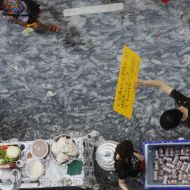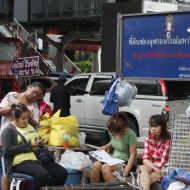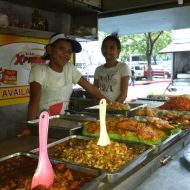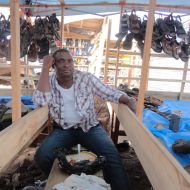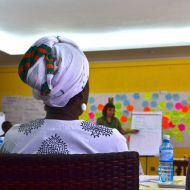Through Haute Couture and Handbags, a Manila Slum Gets a Makeover
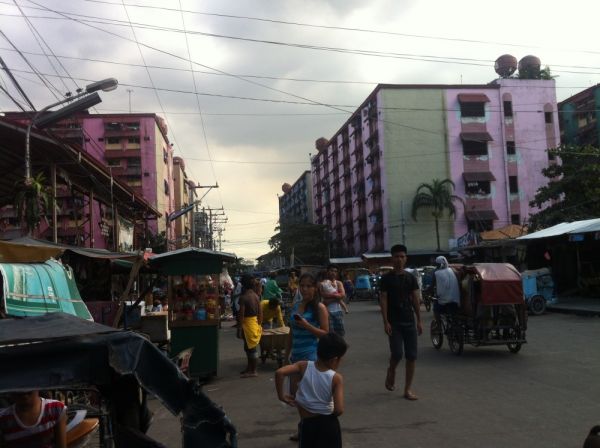
Tondo used to be known for its shanties and violence. Today, it’s a cog in the Philippines’ high-fashion industry. Photo credit: Purple Romero
Angelita Montelibano, 63, knows the story of Smokey Mountain like the back of her hand. She can tell you how many times the huge dump of garbage has caught fire since the 1980s. She knows how many times the thousands of informal settlers like her have been caught in bloody protests against authorities who have tried again and again to demolish their shanties.
And Montelibano can say with certainty that underneath the heaps of fetid trash, there is gold in Smokey Mountain, once a symbol of poverty in Tondo, Manila.
When she was young, Montelibano used to scavenge for a living, and would find jewelry in the dump that she could sell to pawnshops. Those days are long gone, however. Smokey Mountain was shut down in 1996. On its site now sits russet soil, where Montelibano and other families plant vegetables. If you look closely, you can see pieces of plastic garbage still sticking out of the ground among the rows of corn and jute leaves.
The wooden shanties have been replaced with colorful buildings, and it no longer feels dangerous to walk the streets that lead to the former site of the dump. The mere mention of the district of Tondo used to invoke images of gangs and their violent brawls, of crimes and discord. Now Tondo and its Smokey Mountain serve instead as a hub for social entrepreneurship, where social problems are addressed through homegrown innovations.
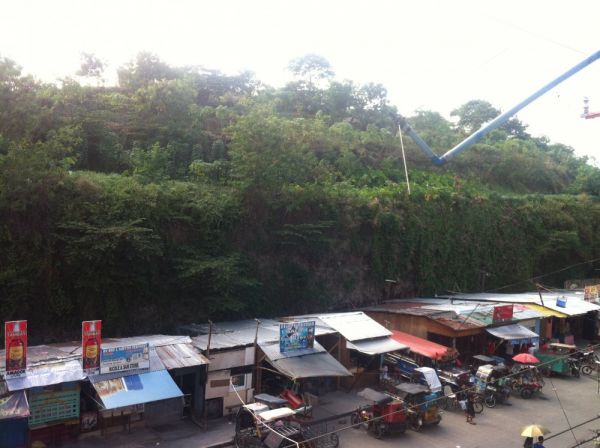
Smokey Mountain, a former dump, is now a fertile area where crops are grown, its transformation reflecting that of the district itself. Photo credit: Purple Romero
The town’s turnaround owes a debt to the fashion industry. Gawad Kalinga (“To Give Care”), an anti-poverty organization, introduced Montelibano and many other women here to Rags2Riches, a social business enterprise that trains women in Metro Manila not only in making clothes, but also how to save money and protect their rights. Created by Reese Fernandez, named a Young Laureate by the Rolex Awards for Enterprise in 2010, and students from Ateneo University in Manila, Rags2Riches connects women to retailers, eliminating the need for middlemen.
The initiative has partnered with renowned Filipino fashion designers Rajo Laurel, Amina Aranaz-Alunan and Oliver Tolentino, who have created designs that turned the rags into bags, wine holders, purses and other products. Laurel, a judge on Project Runway Philippines, notably launched his latest line of bags using Rags2Riches material in March 2012. Through its newfound links to the world of haute couture, the former slum has evolved into a cog in the region’s high-end clothing sector and a generator of skilled employment.
The enterprise is no charity project – because of the designers’ celebrity, standards for the quality of work are extremely high. In Tondo, around 50 women attended the training session conducted by Rags2Riches in 2007, but only 15 went on to work for them. Some of the others opted to make ordinary rags instead, a much easier trade, but one for which they earn only about one dollar per day. Through Rags2Riches, Montelibano earns P600 ($14 USD) per week, 20 percent of which, according to Rags2Riches community coordinator Cynthia Cabrera, is automatically invested in savings.
The business has transformed the lives of many in the community. Donna Buluran used to spend most of her money on clothes and wares at the market. After attending a seminar on financial literacy provided by Rags2Riches, her ambitions have grown. “I want to save more and buy a house someday,” she says. She’s also taking on a leadership role as the coordinator for Tondo, and has attended computer literacy workshops and undergone training in language proficiency. Now, the college dropout will be supervising the work of women older than she is, making sure that Tondo retains its reputation as one of the enterprise’s most reliable producers.
Montelibano, for her part, learned to stand up to her husband, who she says dissuaded her from working for the group. “He said I spend more time working than taking care of him and our grandchildren.” She’s not alone. Cabrera says one of their women artisans was berated by her husband for bringing “trash” into their already dirty home. This is why the organization integrated women’s rights in its training, she says. “Reality is, in the environment we live in, women are sometimes still not allowed by their husbands to earn their own money.”
Tondo is in the midst of a major transformation. Progress will not happen in a day — inside some of its buildings, a sense of poverty remains palpable. Some of its residents still work as scavengers, and some don’t work at all. But in the same buildings, women like Buluran live and evolve. Smokey Mountain’s story is slowly changing. With creative solutions planted in its soil, it’s growing.

